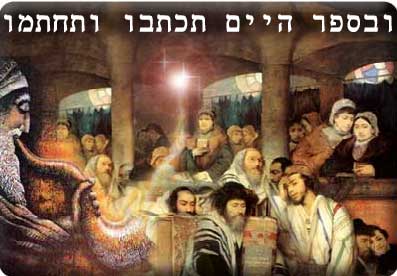
Yom Kippur, the holiest day in the Jewish calendar, calls for profound repentance and spiritual reflection. Observed on the tenth of Tishrei, this sacred day involves fasting, prayer, and a communal plea for forgiveness. From the solemn Kol Nidre to the closing Ne’ilah, Yom Kippur rituals guide believers in seeking divine connection and atonement. The day ends with the blowing of the shofar, marking the conclusion of this significant spiritual journey and sealing one’s fate for the coming year.
The Call for Community Compassion
Jewish scholars firmly believe that if a person has wronged another, simply participating in Yom Kippur services and reciting prayers will not be enough to cleanse such transgressions. So, on the eve of Yom Kippur, it is customary for the Shaliach Tzibbur (prayer leader) to stand before the congregation prior to the ceremony and ask everyone to forgive and pardon one another with pure hearts, setting aside any past wrongdoings or misunderstandings.
The Significance of Yom Kippur
According to the Torah (Leviticus 16:29-34), Yom Kippur, also known as the Day of Atonement, is one of the holiest days in the Jewish calendar. Falling on the tenth day of Tishrei, Jews observe this day with a significant fast (ta’anit) and gather in synagogues for prayer and supplication. From the evening of the ninth of Tishrei until the night of the tenth, Jews abstain from eating and drinking, dedicating themselves wholly to spiritual pursuits and seeking connection with the Divine.
The believers spend the night freeing themselves from the constraints of the material world and actions that merely fulfill physical needs, joining the spiritual realm. With hearts filled with Divine love and purified souls and spirits, they participate in the banquet of truth through repentance and returning to God. In other words, Yom Kippur is the day when the spirit, liberated from material constraints, attains its highest level of perfection in serving God.
A Time for Introspection
Jews believe that during the ten days of repentance from Rosh Hashanah to Yom Kippur, known as the Days of Awe (ימים נוראים), the fate of each individual for the coming year is suspended. It is on Yom Kippur that their fate for the next year is sealed, making these days are an opportunity for introspection, repentance, and making amends. During these ten days, believers reflect on their religious conscience, recalling the sins and wrongdoings they have committed. By reciting a prayer called Avinu Malkeinu (אבינו מלכנו), they express their remorse and repentance to the Almighty.
Historical Traditions
During the time of the Second Temple, the special Yom Kippur ceremony was conducted by the High Priest (Kohen Gadol). He would offer sacrifices to atone for sins, burn fragrant herbs as incense, and recite confessions. Then, he would enter the Holy of Holies (Kodesh HaKodashim) in the Temple and perform the rituals with great splendor.
Observances of Yom Kippur
In Leviticus, Chapter 16, Verse 30, it is mentioned, ‘This shall be a lasting ordinance for you: On the tenth day of the seventh month you must afflict your soul and you must not work, because on this day, atonement will be made for you to cleanse you. Then, before the Lord, you will be clean from all your sins.’
The rules and regulations of Yom Kippur have largely remained unchanged since the time of the Second Temple. From that era, the observance of this ceremony has underscored its profound importance and significance. As a result, Yom Kippur is regarded as the most significant religious ritual and the most important day of the year for Jews.
How to “afflict the soul”
Although the Holy Book does not specify a particular method for afflicting the soul, prophets and other sacred texts regard fasting as one of the most important ways. Jewish scholars believe the soul can be afflicted in five ways:
- Fasting and abstaining from eating and drinking.
- Refraining from unnecessary washing and bathing (for pleasure).
- Avoiding the use of oils (such as cosmetics, creams, and perfumes).
- Refraining from wearing leather shoes.
- Abstaining from marital relations.
That said, it is clear that fasting has become the most important practice to “afflict the soul”. The faith exempts people who may be harmed from fasting or other observances of Yom Kippur, although believers have been advised to eat sufficiently on the days prior to Yom Kippur to prepare themselves for the fasting.
Candle lighting and berakhah
Before sunset and the start of Yom Kippur, it is customary for the lady of the house to light two candles and recite a berakhah. If Yom Kippur falls on Shabbat, she lights two candles and says the Yom Kippur berakhah first, followed by the special Shabbat berakhah.
Before fasting
Before the fast begins, family members, especially the younger ones, seek forgiveness from their elders for any mistakes made during the past year. The elders, in turn, forgive them and offer their blessings.
The evening
On the evening of Yom Kippur, before the start of the Maariv prayer, the Torah scroll is taken out from the Ark, and ‘Kol Nidre’ is recited to nullify all forgotten religious vows and pledges. Afterward, the blessing of the Torah scroll is recited, followed by the Maariv prayer and the Selichot service.
The conclusion and closing of the gates
Traditionally, four prayers are recited on Yom Kippur: Shacharit, Musaf, Mincha in the afternoon, and Ne’ilah in the end. As Yom Kippur draws to a close, the final prayer, Ne’ilah, is recited. This prayer symbolizes the closing of the heavenly gates, marking the end of the atonement period. The service concludes with the blowing of the shofar, the reading of the Maariv prayer, and the recitation of the Havdalah, signifying the end of the holy day.
The Essence of Yom Kippur
Not a day of mourning
It is important to note that Yom Kippur is not a day of mourning but rather a sacred holiday. To honor this day, one should wear clean clothes and refrain from working. The types of prohibited work are the same as those forbidden on Shabbat.
Meaning of Yom Kippur
The term “Yom Kippur” means atonement and forgiveness of sins. It also emphasizes its nature as the Day of Divine Judgment, the Day of Justice, and the moment of the court’s verdict. Other interpretations and meanings include:
- Yom HaKadosh: The Holy Day, dedicated more than any other day to the relationship between humans and God.
- Yom HaSelichah: The Day of Forgiveness and pardon of sins.
- Yom Adir: The Day of Greatness and Glory, where prayers particularly highlight God’s majesty and grandeur.
- Yom Asor: The term “Asor” means the number 10, referring to the tenth of Tishrei.
A chance to cleanse one’s self properly
Yom Kippur holds a special place for Jews. According to the Mishnah, on Yom Kippur, sins against God are forgiven through repentance. However, sins against fellow humans are only forgiven if the wrongdoer seeks forgiveness and reconciliation from the person they wronged. This underscores the importance of human relationships in the eyes of both God and the faith. Yom Kippur is an opportunity for atonement and forgiveness for those who sincerely repent and confess their wrongdoings. Even those who are far from their families make an effort to be with them for the Yom Kippur fast.

Torah Reading
On Yom Kippur
Yom Kippur, includes two Torah readings:
Morning Reading (Shacharit):
- Parashat Acharei Mot (אחרי מות): From Leviticus 18:1-30, this section focuses on the origins of Yom Kippur.
- Maftir: Taken from Numbers 29:7-11, this section is related to the Yom Kippur sacrifices.
- Haftarah: From the book of Isaiah, chapters 57:14-21 and 58:1-14.
Afternoon Reading (Mincha):
- Parashat Acharei Mot: From Leviticus 18:1-30, discussing the Divine laws addressed by Moses to the Israelites.
- Haftarah: From the book of Jonah, chapters 1:1-16, 2:1-11, 3:1-10, and 4:1-11, along with Micah 7:18-20. This focuses on Jonah’s journey to Nineveh.
Erev Yom Kippur
On the day before Yom Kippur, known as Erev Yom Kippur, it is customary to slaughter a rooster or a chicken for atonement of sins. The following statement is recited:
“May this chicken be my atonement; its blood shed instead of mine.”
If the religious slaughtering of a chicken is not possible, one can donate the value of the bird to the poor instead.
Calendar Observance
In the Hebrew calendar, Yom Kippur never falls on a Sunday, Tuesday, or Friday.


 فارسی
فارسی